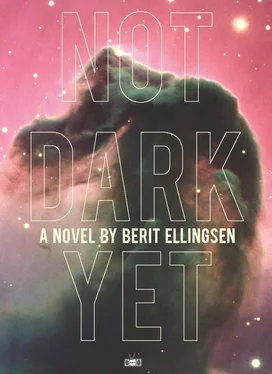He hit the water hard, bounced once along it like a skipping stone, and for a frightening moment he thought he would keep going, but then his motion slowed enough for the ocean’s surface to soften and take him in.
He let himself sink into the dark, still curled up, struggling not to gasp from the cold water that rushed into his nose and ears and clothes. He wondered if the rubber vessel would turn to search for him, but he thought not. Their window of opportunity was limited, and he had shown himself a traitor before they had even started. Still curled up, he blinked against the cold water, tugged at his boots with slow, deliberate motions to make the oxygen he had last longer. He expected resistance, but the boots came off even though his fingers were growing stiff from the chill. The water must have softened the lining. The rifle was gone, it no longer hugged his body. He imagined it falling through the water, sailing back and forth like a black feather, before being swallowed up by the deep. He kicked to get to the surface while he pulled the top of the coveralls off.
He had just enough air to stop for a few seconds to listen for the sound of nearby engines before he broke the surface. There was none, only a low, distant hum that vanished quickly in the wind and the waves. He scanned the darkness for the telltale motion of the lightless vessel, but saw nothing. Staying low in the water, he discarded the coveralls, then began to swim toward land.

At first the water was warmer than he had mentally prepared for when he left the craft. He had expected muscle cramps from the chill, but that didn’t happen. It was cold, but not as cold as it would have been that early in the spring a few years back. The wind had picked up and lashed the surface white, but it hadn’t been blowing for long, so the waves were still manageable. The water was still cool enough to chill him and the piercing wind made his ears ache.
He hoped they assumed he had drowned, but he nevertheless glanced back several times. After about forty-five minutes of swimming at medium speed to pace himself, the cold began to bother him. It had been a long time since he had swam in the sea in early spring, and when he did he had worn a wetsuit. The salt burned his eyes, blurred his vision and forced itself into his nose and mouth. His right hand, whose bones still bore plates and screws after his visit to the abandoned asylum last spring, turned stiff and aching. The shore was still far away.
He used to think that when people drowned they behaved like sinking characters in films or on TV, splashing and yelling and waving their arms. But during his training he learned that people who were about to drown were quiet and exhibited little motion. He had assumed that was due to embarrassment and an erroneous belief that they would manage to get out of the trouble on their own, but according to the instructor, this was caused by the nature of drowning itself. Drowning victims were running out of air even if they managed to keep their mouth above the surface. In medical terms, drowning was slowly suffocating from lack of oxygen; it wasn’t just getting water in the lungs.
Were the wind and the current taking him away from land? He gulped and snorted, trying to get rid of the water in his mouth and nose, but his breathing, which had started controlled and regular, had become more and more imbalanced. Every time he thought he was on the up stroke and had his chin above water, a wave arrived and splashed him in the face, forcing him to swallow mouthfuls of sickening seawater. He gagged and coughed and spat, but soon a coppery flavor told him his nose was bleeding from the salt and the force of the waves, while all the muscles in his body hurt from straining against the sea.
He started to wonder whether drowning was the end that had been chosen for him, that he would be devoured by the deep as easily as the rifle, by an element he had always felt comfortable, even intimate, with. But as he swallowed the last mouthful of seawater he thought he could take, completely out of breath, and knew he had reached the limit of his endurance, he saw that the lights on the beach were substantially closer. He continued to reach for them, with one more stroke, and another, and another. His hands and feet were stiff from cold, blood running down his face, while he was dog-paddling more than swimming. He put all his focus on keeping air in his lungs for buoyancy. Then the ocean roared and roiled and he felt it swell behind him, like the maw of a Kraken about to rise up from the deep. The motion surged his body forward, and there was no resisting or refusing being engulfed. Realizing his complete and utter helplessness, he gave in to the sea the same way he did with the inner brightness and let it carry him where it wanted to.
The long wave didn’t crash or slam him back into the water, but crested gently without foam, then threw him up on land like a distasteful meal. It even pushed him a little into the cold sand, so that when the surf finally receded back into the ocean, he was left lying in a depression shaped like his own body, too exhausted to even cough.
THE OCEAN NIPPED AT HIS TOES AND SPLASHED his feet and ankles, each new wave renewing the intensity of his shivering. An icy wave rolled as far as his crotch, causing him to gasp and open his eyes. He pushed his hands and knees beneath him and stumbled up. The beach tilted back and forth and his ears were ringing with pain. His arms and legs were stiff and ached from freezing. He was so cold it felt like he’d never stop shaking.
The beach and the slope up to the road were still a wall of darkness ahead, but behind him the sky had started to pale. At the horizon the dawn had broken through the clouds and silhouetted them against the blue of the pre-dawn sky. The knowledge that he must not be seen took over and pushed him onward.
Above the beach the hill had been sectioned into small communal gardens, separated by low hedges of boxwood and spirea. Each garden held a modest building, sheds or greenhouses he thought at first, but as he drew closer they turned out to be small wooden cabins painted in warm primary colors. The walls of the miniscule structures were covered in trellises and vines of climbing plants. Most plots had rows of vegetable or flower beds, but he also spotted a faux marble fountain and a sleeping brass fawn. The patchwork of gardens was protected by a chain-link fence, but a shed leaned against it in the corner by the gate. He followed the fence to the shed, climbed the chain-link, and landed on the roof. From there he jumped into the damp grass.
He assumed the communal garden was used mainly in the summer, but some owners might have started working on their crops early, so he had to be quick. Further in among the hedges and less visible from the road, he tried the doors and windows of each cabin, shed, and greenhouse. But the cabin doors were locked and no window was ajar in the early spring weather; some of them were still shuttered. Most of the sheds and greenhouses were locked as well, some with recent padlocks and chains, and those that were open offered only tools, seeds, and fertilizer.
After having tried several doors and helping himself to some soft winter apples from a cardboard box in a greenhouse, he finally found an unlocked shed. The space inside was long and narrow, with shelves made from simple planks, stacked with old cans of nails, screws, paint, and wood varnish, as well as plastic containers with herbicides and rat poison. A broom, hoe, and rake leaned against the shelves. On the floor was a paint-spattered high-pressure water cleaner and a plastic bucket. Behind the door hung a blue janitor’s coat, a pair of wide cotton shorts, and a sweatshirt full of white paint stains. Beneath them stood two orange plastic clogs and two navy rubber boots. He took all the clothes and the rubber boots outside with him and pulled them on with shivering hands. The clothes were too large to fit well, but not too wide to move in. The coat smelled of weed killer and sun lotion, a summer world a universe away.
Читать дальше













